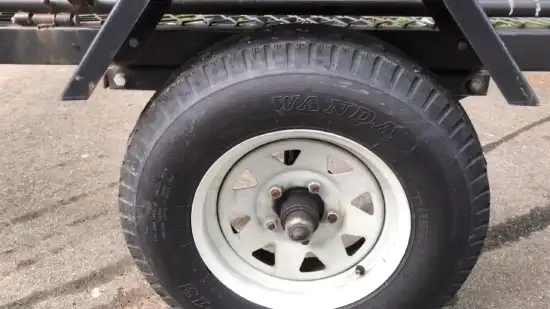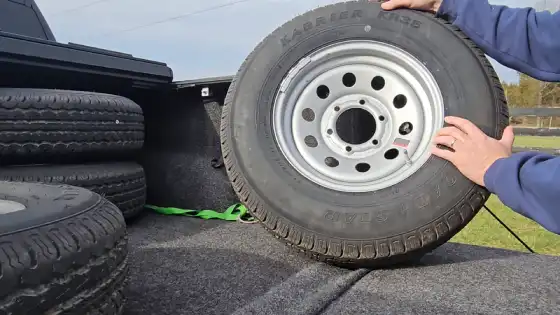Last Updated on July 24, 2023
Ensuring that your trailer tires are inflated to the appropriate PSI is crucial for a safe and efficient towing experience. But, identifying the optimal PSI can be a challenging task. Now you might think, what PSI should my trailer tires be at?
Numerous factors are at play, such as the type of tire, the weight of your load, and the outside temperature. While many trailer tires are generally inflated between 50 and 65 psi, this is a rough estimate.
To ensure maximum safety and performance, it’s essential to follow the precise recommendations provided by the tire manufacturer.
Here, we will explain the elements that influence trailer tire PSI and provide comprehensive guidelines to help you determine the right pressure for your specific trailer. So, let’s dig deeper and explore how you can optimize your trailer’s tire pressure for a smooth, stress-free ride.
What Factors Affect Trailer Tire PSI?

To ensure optimal performance and safety while towing your trailer, it’s important to consider several factors that can affect the PSI of your trailer tires. Here are a few important elements to consider:
- No 01: Load Capacity
- No 02: Tire Size and Type
- No 03: Speed Rating
- No 04: Ambient Temperature
- No 05: Altitude
- No 06: Tire Wear and Condition
No 01: Load Capacity
Ensure your trailer tires are properly inflated based on the cargo’s weight, as exceeding load capacity ratings can result in premature tire failure. The load capacity table or chart provided by the manufacturer correlates tire pressure with the weight being carried.
Here are some key factors to consider when determining the proper tire pressure for your trailer:
Load weight: The weight of the cargo being carried is the primary factor in determining tire pressure. Make sure to weigh your cargo and consult the load capacity chart to determine the correct tire pressure for the carried weight.
Tire size: Different tire sizes have different load capacity ratings and require different tire pressures. Check the tire size and corresponding load capacity rating before determining the proper tire pressure.
Speed: Higher speeds generate more heat, which can increase tire pressure. Make sure to adjust your tire pressure accordingly if you’ll be traveling at higher speeds.
Temperature: Heat also affects tire pressure, with higher temperatures causing the air inside the tire to expand. Check tire pressure frequently in hot weather and adjust as necessary.
No 02: Tire Size and Type
Even though tire size and type may vary, it’s crucial to refer to the manufacturer’s specifications or tire sidewall markings for the appropriate pressure range to ensure safety on the road.
The load capacity of a tire is affected by its size and type. Therefore, tire size and type have a direct impact on the recommended PSI for a trailer tire.
Different tire sizes and types have varying load capacity ratings and inflation requirements. For instance, a larger tire can carry more weight and may require a higher PSI than a smaller tire of the same type.
Similarly, a radial tire may require different PSI levels than a bias-ply tire. Understanding the load capacity and inflation requirements of your specific tire size and type is essential to avoid overloading or underinflating your trailer tires.
No 03: Speed Rating
While traveling at higher speeds, it’s important to consider the speed rating of your trailer tires as it indicates the maximum safe operating speed and can affect tire pressure. Here are three things to keep in mind regarding speed rating:
- The speed rating is calculated based on laboratory tests and indicates the maximum safe speed for a tire when it’s properly inflated and in good condition.
- Exceeding the speed rating of your trailer tires can lead to heat buildup, which can cause the tires to fail. This can be especially dangerous while towing a heavy load.
- It’s important to follow the manufacturer’s recommendations for tire pressure to accommodate the increased heat generated when traveling at higher speeds. Failure to do so can result in decreased tire life and an increased risk of blowouts.
Keep in mind that speed ratings are not the only factor to consider when towing a trailer. You should also pay attention to the weight capacity and load index of your tires and their overall condition and age.
No 04: Ambient Temperature
It’s important to note that every 10-degree Fahrenheit change in temperature can cause a 1 psi change in tire pressure. As ambient temperatures fluctuate throughout the day, your trailer tires may experience significant pressure changes.
To ensure optimal tire performance, it’s crucial to regularly check and adjust the tire pressure based on ambient temperature variations. During seasonal changes, such as transitioning from summer to winter, it’s especially important to monitor your trailer’s tire pressure.
This is because cold weather can cause the air inside the tire to contract, leading to a decrease in tire pressure. On the other hand, hot temperatures can cause tire air to expand, leading to an increase in tire pressure.
No 05: Altitude
At higher altitudes, tire pressure decreases due to lower atmospheric pressure, so it’s important to regularly check and adjust tire pressure to ensure safe and efficient towing.
As you ascend to higher elevations, the air pressure outside of your tires decreases, which can cause the air inside your tires to expand. This expansion can increase tire pressure, which may exceed the recommended limit for your trailer, causing a blowout or other safety hazards.
To avoid these problems, check your trailer’s tire pressure before towing at higher altitudes. Use a tire pressure gauge to measure the pressure and adjust it to the recommended psi for your specific trailer and tire. This information is typically found in the owner’s manual or on the sidewall of the tire.
No 06: Tire Wear and Condition
It’s truly amazing how much a set of worn-out tires can affect the safety and performance of your towing experience. Tires beyond their useful life or damaged can cause all sorts of problems, including a decrease in tire pressure.
As a result, it’s essential to keep a close eye on your trailer tires’ condition and replace them as needed. Regularly inspect your tires for any signs of wear or damage, including cracks, bulges, or punctures. If you notice any of these issues, it’s time to replace your tires immediately.
Additionally, make sure to follow the manufacturer’s guidelines for tire maintenance and replacement to ensure optimal performance, safety, and longevity.
Should I inflate my trailer tires to max PSI?

Inflating your trailer tires to their maximum recommended PSI can improve tire longevity, fuel efficiency, and overall safety on the road. Here’s why:
- By inflating your tires to the recommended PSI, you reduce the amount of flex in the sidewall of the tire. This means the tire will generate less heat, which can help prevent blowouts and other road-related issues.
- Additionally, properly inflated tires can help improve fuel efficiency. This is because when your tires are underinflated, they create more rolling resistance, which makes your engine work harder and burn more fuel.
Should I run my tires at max PSI when towing?
When you’re towing, you want to ensure your tires can handle the weight you’re carrying without risking any potential problems on the road. It’s important to inflate your trailer tires to the max cold pressure listed on the tire’s sidewall.
Running your tires at the maximum PSI ensures that they can handle the load you’re carrying and prevent any accidents on the road. Even if you’re only towing half the weight your vehicle/tires can handle, running your tires at half the max cold PSI is not recommended.
Should I increase tire pressure for a heavy load?
To safely transport a heavy load, you must ensure that your vehicle’s tires can handle the weight without compromising their structural integrity. This may require increasing the tire pressure above the normal level specified in your vehicle’s handbook.
It’s important to note that each tire has a maximum air pressure and weight capacity, so you should always stay within these levels. Doing so could cause the sidewalls to bulge excessively, making the tires more prone to blowouts and reducing lifespan.
When increasing tire pressure for a heavy load, ensure you don’t exceed the maximum air pressure rating. Also, always check the tire pressure when the tires are cold, as heat generated during driving can cause the pressure to increase.
Proper Tire Inflation: The Key to Safe Trailer Towing
Correct tire pressure is critical for your trailer’s safety and performance. Ignoring this essential factor can lead to serious consequences, including increased fuel consumption, reduced tire life, and even tire failure.
To ensure optimal tire pressure, consider your trailer’s load capacity, temperature, and speed, and always refer to your tire manufacturer’s recommendations. Remember, overinflating your tires can be as harmful as underinflating them, so find a balance that works for your towing needs.
Moreover, regularly monitoring your tire pressure is only the first step. Adjust your tire pressure according to the specific load you are carrying, and never exceed your vehicle’s weight capacity. Neglecting to do so can cause excessive heat buildup, leading to tire blowouts and costly repairs.



